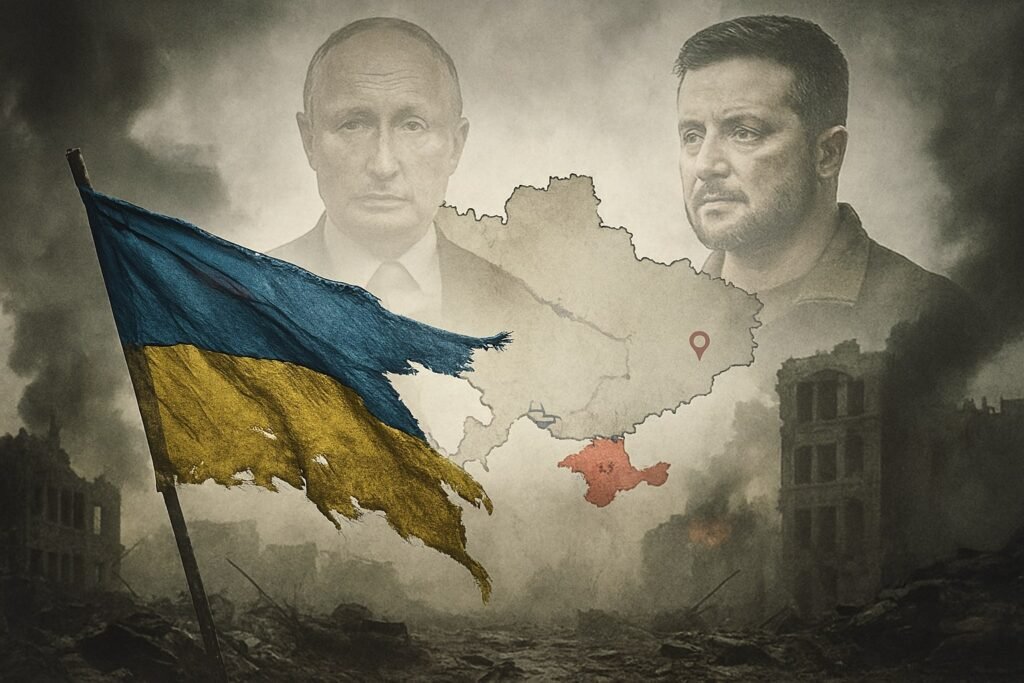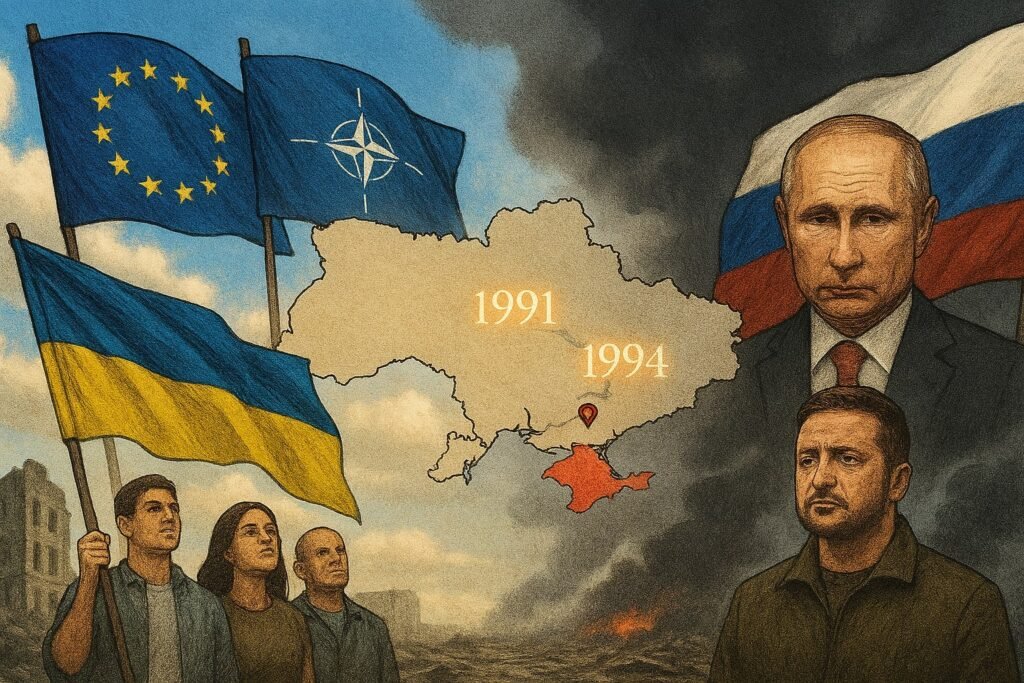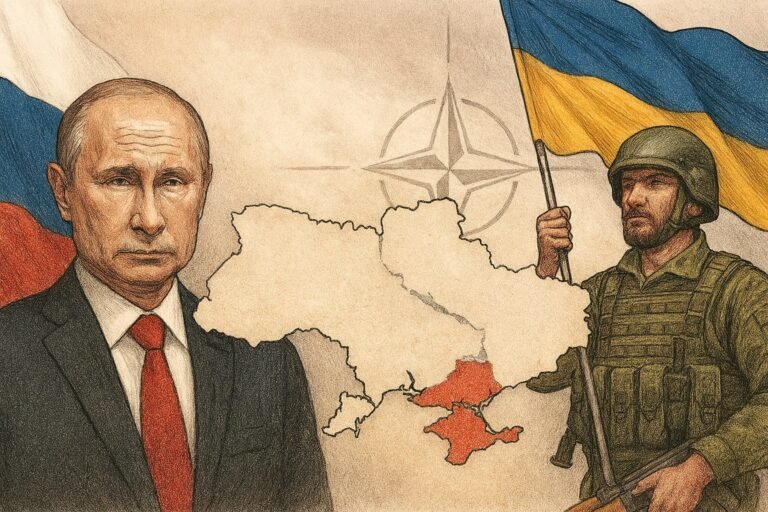Why did Russia invade Ukraine?
Russia invaded Ukraine for many reasons. The roots go back to history, power, and identity. NATO grew east after the Cold War. Russia saw this as a threat. In 2014, Russia took Crimea. That was a big turning point.
Vladimir Putin believes Ukraine belongs in Russia’s orbit. He fears Ukraine joining the West. This fear mixes with pride and control. The result is war.
The invasion is not just about land. It is about Russia, Ukraine, and the West. It is also about freedom and choice. This article gives you the story in simple words 10 Reasons Russia Invaded Ukraine
Main Reasons Russia Invaded Ukraine
1. NATO Expansion and Russia’s Security Concerns
Russia invaded Ukraine partly because it feared NATO moving closer.
NATO is a defense group formed in 1949. After the Cold War, many East European nations joined. To Russia, this looked like a threat.
Ukraine began to work more with NATO. It held joint drills and wanted to join one day. This alarmed Moscow.
For Vladimir Putin, NATO was not only a danger to security. It also meant Russia could lose power in Eastern Europe.

2. Ukraine’s Independence and Identity
Ukraine wanted to join the West. This worried Russia.
After the Soviet Union ended in 1991, Ukraine became independent. It had the third-largest nuclear arsenal. Later, it gave it up under the Budapest Memorandum (1994). In return, Russia, the US, and the UK promised to protect it.
Many Ukrainians saw independence as a chance to build a new identity. They wanted Europe, democracy, and sovereignty. Putin disagreed. He said Ukrainians and Russians are “one people,” denying Ukraine’s nationhood.

3. The Euromaidan Revolution (2013–2014)
Protests in Ukraine led to Russia’s attack.
In 2013, President Yanukovych stopped a trade deal with the European Union. He turned to Russia instead. People protested. This became the Euromaidan Revolution.
By February 2014, Yanukovych ran away. A pro-Western government took over. Putin said this was a coup backed by the West. He used force in response.
4. Annexation of Crimea (2014)
Crimea was Russia’s first big move against Ukraine.
In March 2014, Russian troops took over Crimea. This peninsula is home to Russia’s Black Sea Fleet. A vote was held. Most said yes, but many called it unfair.
Crimea gave Russia:
- Control over the Black Sea.
- A symbolic win for Russian pride.
- A base to influence Ukraine.
This takeover started open conflict.
5. The Donbas Region Conflict
Russia helped separatists in Donetsk and Luhansk to weaken Ukraine.
In 2014, armed groups in Donbas declared “people’s republics.” Russia said it was not involved but sent weapons, fighters, and advisers.
From 2014 to 2021:
- Over 14,000 people died.
- 1.5 million Ukrainians had to leave their homes.
- A “frozen conflict” grew, giving Russia power over Ukraine.
This set the stage for the 2022 full invasion.
6. The 2022 Full-Scale Invasion
Russia invaded to weaken Ukraine and stop NATO ties.
On February 24, 2022, Putin announced a “special military operation.” Russia attacked from the north, east, and south. They targeted big cities, including Kyiv.
Putin said his goals were to:
- “Demilitarize” Ukraine.
- “Denazify” Ukraine (a false claim).
- Protect Russian-speaking people.
- Stop Ukraine from joining NATO.
Ukraine fought back. President Zelenskyy led the resistance. His words, “I need ammunition, not a ride,” became a global symbol of courage.
Real-World Scenarios & Experience
The Ukraine war shows that information battles are as important as military fights.
For example:
- Sanctions: Over $300 billion in Russian assets were frozen.
- Humanitarian crisis: More than 8 million Ukrainians fled to Europe.
- Energy shock: Gas prices in Europe rose over 80% in 2022.
Strengths in Ukraine’s Resistance
- Strong leadership under Volodymyr Zelenskyy.
- Western weapons and training support.
- National unity forged through crisis.
- International legitimacy and sympathy.
Weaknesses in Russia’s Strategy
- Underestimating Ukrainian resistance.
- Weak logistics and morale.
- Heavy economic costs due to sanctions.
- Diplomatic isolation.
Comparison Table: 10 Reasons Russia Invaded Ukraine
| Factor | Russia’s View | Ukraine/West’s View |
|---|---|---|
| NATO Expansion | Encirclement, threat to security | Defensive alliance, sovereign choice |
| Ukraine Identity | “One people” with Russia | Independent nation, EU aspirations |
| Euromaidan | Western-backed coup | Democratic revolution |
| Crimea | Restoring Russian territory | Illegal annexation |
| Donbas | Protecting Russian speakers | Russian-backed separatism |
| 2022 Invasion | Defense against NATO | Aggression, violation of sovereignty |
FAQs 10 Reasons Russia Invaded Ukraine
1. What are the main reasons Russia invaded Ukraine?
NATO expansion, Ukraine’s Western alignment, the Euromaidan Revolution, Crimea, and the Donbas conflict all contributed.
2. How does NATO affect the conflict?
Russia sees NATO as a threat; Ukraine sees it as protection.
3. Why is Crimea important?
Crimea provides Russia with military bases, sea access, and symbolic value.
4. What role does Volodymyr Zelenskyy play?
Zelenskyy became a symbol of Ukrainian resistance and international diplomacy.
5. What is the Budapest Memorandum?
A 1994 agreement where Ukraine gave up nuclear weapons in exchange for security guarantees.
6. Has the invasion achieved Russia’s goals?
No. Ukraine resisted strongly, and Russia faces heavy losses and sanctions.
7. How has the war affected the world?
It caused refugee crises, food shortages, energy shocks, and global inflation.
Conclusion
The reasons Russia invaded Ukraine are not simple—they mix history, security fears, ideology, and identity. From the Budapest Memorandum to the Euromaidan Revolution, and from Crimea to the Donbas region, every stage shows the clash between Russia’s ambitions and Ukraine’s sovereignty.
Today, the war remains unresolved. Ukraine continues to fight for independence under Volodymyr Zelenskyy, while Vladimir Putin frames the war as a defense of Russian influence. The outcome will shape not only Ukraine’s future but the global order.
Author Bio
Author: John Mearsheimer
John J. Mearsheimer is a political scientist and professor at the University of Chicago, known for his expertise in international relations and realist theory. I was write extensively on geopolitics, security, and U.S.–Russia relations. I research offers critical insights into the Ukraine conflict, NATO expansion, and global security dynamics.
Publisher: Cato Institute
Source: Cato Institute
References
- United Nations General Assembly Resolutions on Ukraine (2022–2024)
- NATO Official Statements on Ukraine Partnership
- BBC News, Russia-Ukraine Conflict Timeline
- International Criminal Court, Reports on War Crimes (2022–2024)
- IMF Reports on Global Economic Impact of the War


